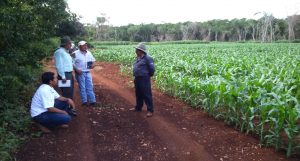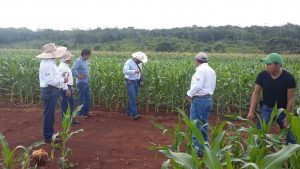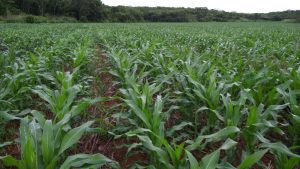
EL BATAN, Mexico (CIMMYT) – Sustainable farming practices allow smallholder farmers to improve maize yields without increasing land, which has proven to reduce deforestation in Mexico’s Yucatan Peninsula according to an independent report commissioned by the Mexico REDD+ Alliance and The Nature Conservancy (TNC).
Conservation agriculture, a sustainable intensification technique that includes minimal soil movement, surface cover of crop residues and crop rotations, was successfully trialed in the south east of Mexico to protect biodiversity and counter rainforest loss caused by a creeping agricultural frontier, as part of a rural development project the Sustainable Modernization of Traditional Agriculture (MasAgro).
Over a year ago, the MasAgro project, led by the International Maize and Wheat Improvement Center (CIMMYT) and Mexico’s Secretariat of Agriculture (SAGARPA), partnered with local organization Pronatura Peninsula de Yucatan to test a sustainable intensification strategy in Hopelchen, a small community in the state of Campeche, where indigenous and Mennonite farmers grow maize following traditional farming practices.

Decades of plowing the fields without crop rotation and applying agrochemicals to control pests have degraded the soils in Hopelchen. As a result, farmers are prone to convert rainforest areas into growing fields to address diminishing crop yields. In an effort to curb this practice, MasAgro introduced conservation agriculture to improve soil fertility and water availability on the fields of five participant farmers.
A key moment during the project was when producers saw the benefits of conservation agriculture after two months of drought. Participant farmers achieved more developed maize cobs than those who did not, according to findings in the MasAgro case study featured in the report, “Experiences on sustainable rural development and biodiversity conservation in the Yucatan Peninsula.”
The positive results have sparked the interest of farmers from adjacent communities who want to get involved in the MasAgro project, said Pronatura’s field manager of sustainable agriculture, Carlos Cecilio Zi Dzib.

“MasAgro has been very successful in the Peninsula,” said Bram Govaerts, CIMMYT’s regional representative in Latin America. “In the course of its second year of implementation, MasAgro has established a research platform and offered training to 150 farmers, who have attended events organized in collaboration with TNC and Mexico’s Agriculture, Forestry and Livestock Research Institute.”
“This work is an effort to document the experiences of some of the sustainable rural initiatives and projects that contribute to reduce deforestation in the region, and thus make their contribution to the conservation and sustainable management of the Mayan Forest in the Yucatan Peninsula,” wrote report authors Carolina Cepeda and Ariel Amoroso.
SAGARPA and CIMMYT plan to present achievements of their MasAgro partnership, including the Hopelchen farmers’ success story, during the United Nations’ thirteenth meeting of the Conference of the Parties to the Convention on Biological Diversity (COP 13), which will take place from December 4 to 17 in Cancun, Mexico.
 Capacity development
Capacity development 
